
The summer has been a great time to connect with residents in the district. And just like that, it is almost time to head back to school! I hope you had a safe and enjoyable summer and that you and your family are energized and ready for the upcoming school year. As your state Senator and a mom myself, one of my top priorities is helping ensure all our kids are set up to succeed.
In this e-newsletter, you can learn about our work to make that reality possible: from universal free meals for all Michigan kids; to information on safe, clean drinking water in all schools and childcare centers; to programs that help make college and postsecondary skills training accessible to all; and much more.
As always, if you or someone you know would like to provide any feedback about what’s happening in Lansing, or needs assistance of any sort, please feel free to reach out to my office. You can contact me by sending an email to SenMMcMorrow@senate.michigan.org or calling 517-373-2523.
Sincerely,

Mallory McMorrow
State Senator
District 8
Legislative Updates
Back-to-School Budget Signed
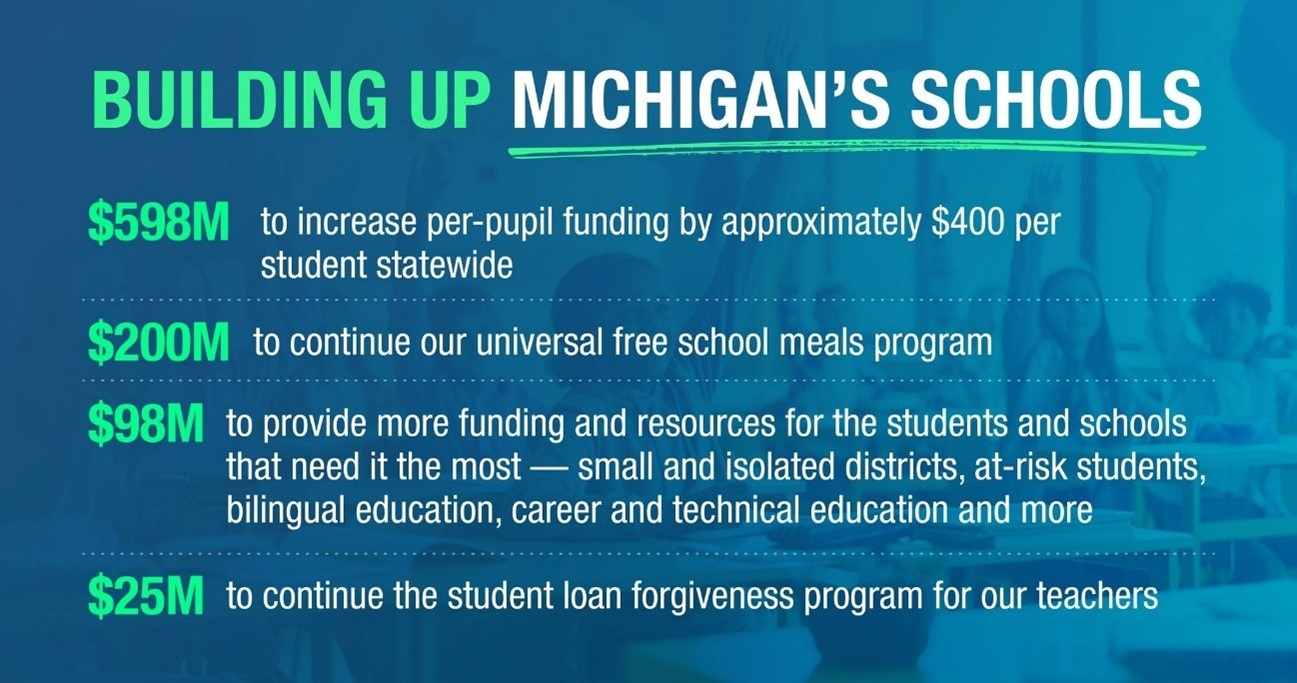
Last month, Gov. Gretchen Whitmer signed the K-12 budget for the 2024-25 school year. This budget continues to put Michigan students and educators first, helping to set our kids up for futures full of success and opportunity.
Last year, the popular free breakfast and lunch program began for all Michigan public school students — and this year, we continued this critical program to ensure that Michigan’s 1.4 million public school students are fed and able to focus on learning. More information about the free breakfast and lunch program can be found here.
Our education budget also implements the state’s first-ever “Opportunity Index” equity funding formula that strategically invests more dollars into districts based on their concentration of poverty, prioritizing students and schools with the highest level of need.
We also delivered on the promise of two years of free community college for high school graduates, helping improve access to higher education and better paying jobs. This ensures that every Michigan high school graduate, beginning this year, can obtain an associate degree or skilled certificate tuition-free, saving over 18,000 students up to $4,820 annually.
More information on the Community College Guarantee here.
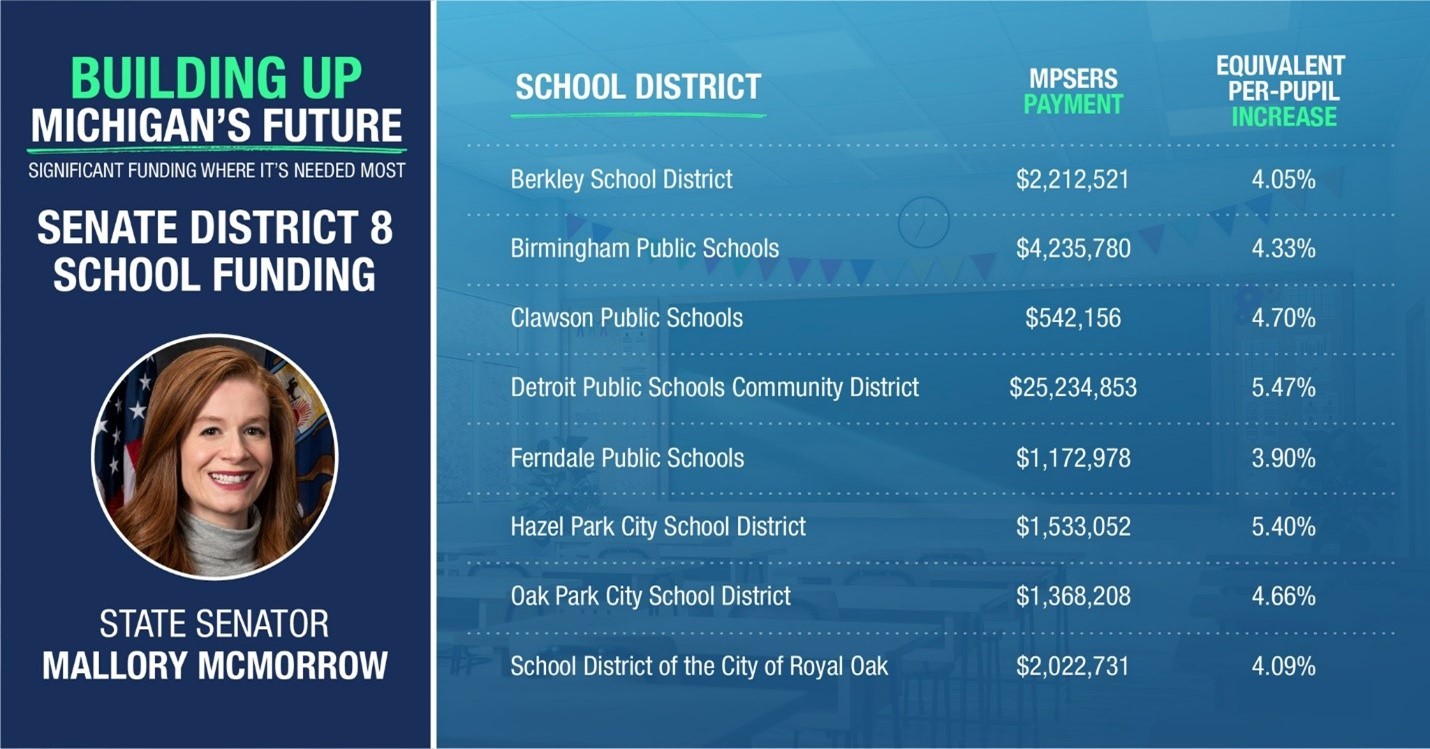
You may have seen some headlines regarding the budget noting that our K-12 schools did not receive a foundation allowance increase. While that is true, it’s not the whole story!
Thanks to our fiscal responsibility over the past many years, the healthcare portion of the Michigan Public School Employee Retirement System (MPSERS) was completely funded as of this year. However, teachers and schools would have still been required by law to pay a percentage into this fund — where those dollars would simply have sat unused.
In this year’s budget negotiations, school groups asked for a 7% reduction in MPSERS payments to account for this change, and we were able to meet them almost entirely there with a 5.75% reduction. Additionally, teachers will effectively receive a 3% pay increase since they will no longer have 3% of their paychecks deducted to pay into this system. These are dollars directly back into our schools’ and teachers’ pockets — and in the above graphic — you can see what that equates to per pupil for each of our school districts.
By leveraging these dollars in this way, it freed the legislature up to fund some of the more aspirational goals of both the legislature and the governor — including significant increases to early childhood education that gets us on track to universal pre-K in the state of Michigan, as well as fulfilling the promise of providing a pathway for every Michigander for tuition-free community college or two years of higher education or skills trainings. Together, we’re getting closer to the vision of a lifetime of learning for every Michigan kid, from pre-K through adulthood.
While the budget considers these MPSERS reductions permanent, a partner policy bill was introduced in both the House and Senate to ensure the statute aligns with the budget. While that policy bill stalled out between the two chambers before the final passage of the budget, I’ll continue to push for this bill to make it through the legislature to ensure this change is permanent.
Automatic Voter Pre-Registration for Teens Getting Their First Driver’s License
In the 2022 election, young voters turned out at a higher rate than anywhere else in the country! But even with record-setting turnout (37% in Michigan versus only 23% nationally), more than 50% of voters aged 18-29 did not vote. We’ve heard countless stories from young voters and their parents that many young voters miss their first election simply because they were away from home or off at college when they turned 18 and missed their chance to get registered back at their home address.
But now — thanks to legislation we passed that was signed into law by Gov. Whitmer — 16- and 17-year-olds can now pre-register to vote. This way, when they turn 18, their registration will automatically become active! This process will be done whenever a young person first gets their driver’s license or Michigan ID, unless they choose to opt out. By granting young Michiganders this option — particularly as they’re learning about democracy and civic engagement in school — we are mitigating barriers to ballot access and helping more residents become engaged, lifelong voters.
Ensuring All Students Have Access to Safe Drinking Water
Staying hydrated is part of good nutrition, which is crucial for student success during the academic year. Our Filter First legislation (Senate Bills 88 and 89) that passed into law in 2023 requires all Michigan schools and childcare centers to implement a Drinking Water Management Plan, including installing and testing filtered bottle-filling stations or filtered faucets on outlets designated for drinking water. By the end of the 2025-2026 school year, all Michigan schools will have approved water filters on all fixtures used for students’ drinking water.
This legislation has widespread support from health and environmental experts. No parent should have to worry about their child being exposed to lead poisoning at school or daycare, just as no student should have to worry about the quality of water coming out of their drinking fountain.
Free School Meals
In 2023, Michigan became one of eight states nationwide to guarantee free meals for kids in schools. Since implementing this program, we’ve heard overwhelmingly positive feedback from parents on not only the cost savings, but the amount of time they’ve saved knowing their kids have meals available for them at school. We know that kids learn better when they can focus on learning and not whether they’re hungry; that’s why we secured $160 million in the Fiscal Year 2024 state budget to provide a year of free breakfasts and lunches to all Michigan public school students. Senate Bill 500 would make this provision permanent. This bill passed out of the Senate Committee on Education and awaits further deliberation.
Gay Panic Bill
Michigan has officially banned the use of the “gay panic” defense, making it the 20th state to outlaw this homophobic and transphobic legal tactic when Governor Gretchen Whitmer signed House Bill 4718 into law.
This legislation states that an individual’s “actual or perceived sex, gender identity, gender expression, or sexual orientation” is not admissible in a criminal trial to “demonstrate reasonable provocation,” “show that an act was committed in a heat of passion” or “support a defense of reduced mental capacity.” It significantly expands protections for the LGBTQ community by protecting them from violent acts of discrimination, prejudice, and hate crimes.
Senate Introduces Legislation to Give Michiganders the Freedom to Plan

While other states work to restrict individuals’ reproductive rights, the Michigan Senate is leading the fight to protect freedom of choice for all.
The Freedom to Plan Act was recently introduced and, if passed into law, would break down financial barriers to over-the-counter oral hormonal contraceptives and emergency contraceptives — providing Michigan residents with the autonomy, power and freedom to make their own medical decisions.
For over six decades, contraception has been an integral component of women’s health care. Named as one of the 10 greatest public health achievements of the 20th century by the Centers for Disease Control and Prevention, contraception has played a pivotal role in expanding women’s bodily autonomy. Giving women and individuals who can become pregnant the ability to determine whether to have children and the number and spacing of their children. Contraception provides Michiganders with the power to plan their own course in life.
These newly introduced bills build on a series of actions taken by the Michigan Legislature to ensure Michiganders — not politicians — possess the power to determine if and when they would like to begin a family. After repealing the state’s archaic and dangerous 1931 abortion ban, we championed the Reproductive Health Act which breaks down barriers to accessing reproductive care by repealing medically unnecessary regulations that are only imposed upon abortion care facilities. Additionally, the Legislature passed the Family Protection Act to modernize the state’s surrogacy laws and protect other forms of assisted reproduction, such as IVF.
News You Can Use
Future College Students: Fill Out Your FAFSA
Filling out your Free Application for Federal Student Aid (FAFSA) can save you thousands of dollars a year off the cost of community, private, or public college. You can unlock grants, scholarships, and other assistance to put you on the path to higher here in Michigan.
One of the new ways you can save on the cost of college is through the Michigan Achievement
Scholarship, a bipartisan scholarship established to lower the cost of community, private, or public college by thousands of dollars a year — up to $27,500 over five years— for most graduating seniors.
All you need to do to qualify for the Michigan Achievement Scholarship is fill out your FAFSA— that is it. Visit FAFSA® Application | Federal Student Aid to fill out your information. In addition to filling out your FAFSA, students can apply for grants and scholarships through the MI Student Aid’s website.
Access your MI Student Aid Portal: MiSSG (michigan.gov)
Black Business Month

August is National Black Business Month! This month-long observance is an opportunity to highlight the many contributions and achievements of Black-owned businesses in the state of Michigan. The Senate has intentionally allocated funding to invest in the entrepreneurial dreams of Michiganders from every walk of life. In the state budget for Fiscal Year 2025, my colleagues and I secured $10 million for grants to uplift minority-owned businesses, as well as $500,000 to support minority-owned food and agricultural businesses in expanding their services to underserved communities — helping diversify the industry and increase Michiganders’ access to nutritious and affordable food.
Overall, small businesses have the power to create jobs, economic growth, and self-actualization for residents. Therefore, championing diversity in business only helps us achieve a more inclusive, welcoming state. If you are looking for ways to connect with, develop, and support Black-owned businesses in your area, please utilize the resources available from the Michigan Economic Development Corporation or reach out to our office to learn more about grant opportunities available to you.
Water Quality Month — Continuing the Fight to Protect Michigan’s Water Quality
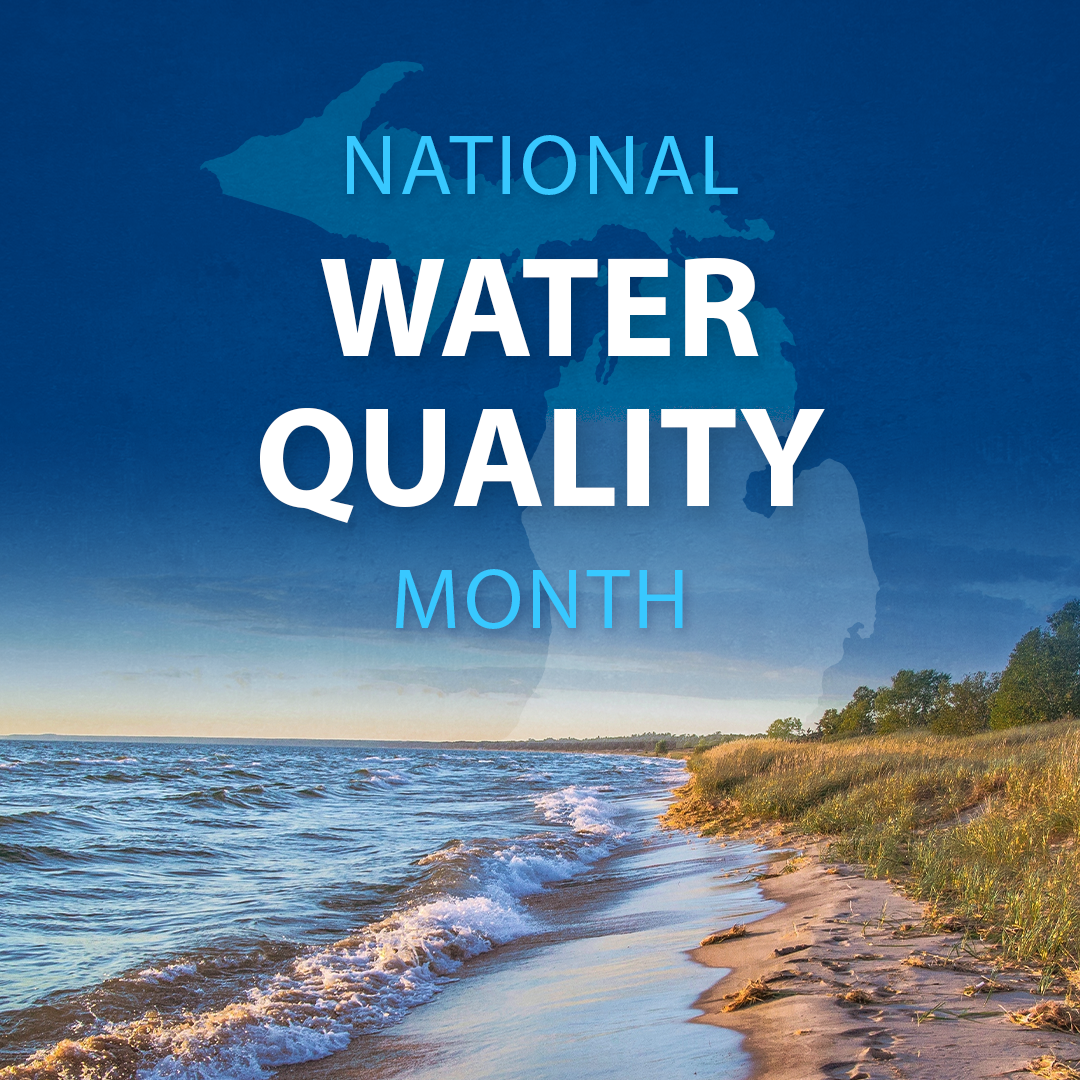
The Great Lakes — Superior, Michigan, Huron, Erie, and Ontario — are more than just a scenic backdrop for summer vacations; they are the lifeblood of our state. And with more than 11,000 inland lakes and countless rivers and streams, there is no other state in the nation more influenced, shaped, or connected by freshwater than Michigan.
Michigan’s water resources provide unparalleled benefits to communities across the state, acting as a source of drinking water, economic opportunity, transportation, recreation, and so much more. Protecting and preserving the state’s lakes requires continuous effort, robust infrastructure, and evidence-based policies.
Fortunately, the Senate has made it a priority to safeguard our water quality for future generations by investing in water infrastructure, combatting pollution, and ensuring all residents have access to clean drinking water.
Since taking office, my colleagues and I have:
- Secured more than $1 billion for water infrastructure projects between the 2024 and 2025 State Budgets. Funding will go towards replacing lead service lines, rebuilding sewers and more.
- Allocated $1.5 million for to enhance the Southeast Michigan Council of Governments’ (SEMCOG) water monitoring program at the 14 community water intakes along the Huron-Erie corridor, helping them protect public health from the harmful impact of potential spills and discharges.
- Passed legislation to combat lead contamination in drinking water and ensure students and teachers have access to clean drinking water in school.
- Championed the historic Clean Energy Future package which sets clean energy standards, promotes energy efficiency, and creates the Office of Community and Worker Economic Transition.
- Passed a bill that provides critical updates for water testing efforts in the state, helping control pollutant discharge from farms and factories.
Read more about the work we’re doing to build up our water infrastructure and strengthen environmental protections, so future generations of Michiganders can enjoy our state’s Great Lakes and unique natural resources for years to come.
August is National Immunization Awareness Month
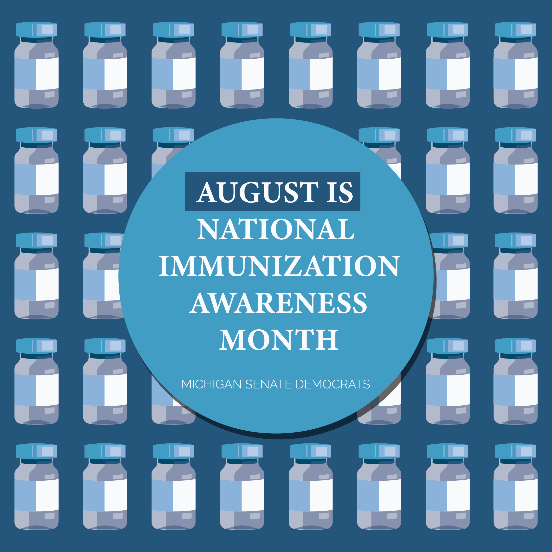
With summer starting to wind down and flu season just around the corner, we recognize National Immunization Awareness Month to highlight the importance of routine vaccination for Michiganders of all ages. Vaccines are the best way for you to protect yourself from preventable diseases and avoid spreading those diseases to others in your community.
- To locate a health department nearest you and get up to date on your vaccines, click here.
- Learn more about the vaccines you and your family members may need to stay healthy, visit the Michigan Department of Health and Human Services website here.
Stopping the Spread of Invasive Species in Michigan
The Michigan Department of Agriculture and Rural Development (MDARD) recently verified a new detection of invasive hemlock woolly adelgid (HWA) on trees on a private property in Leelanau Township in Leelanau County.
Public awareness plays a crucial role in the fight against invasive species.
Suspected infestations in Leelanau County or new areas of the state can be reported by:
- Emailing MDARD at MDA-Info@michigan.gov or calling the Customer Service Center at (800) 292-3939.
- Using the Midwest Invasive Species Information Network (MISIN) online reporting tool or downloading the MISIN smartphone app and reporting from your phone.
Be prepared to report the location of infested trees and, whenever possible, take one or two pictures of infested branches to help confirm identification. To avoid spreading hemlock woolly adelgid, do not collect sample branches or twigs.
Infested trees can be identified by looking on the undersides of hemlock shoots branches for evidence of round, white ovisacs near the base of the needles. Up close, ovisacs resemble cotton balls and may appear alone or in clusters. For assistance in identification, see MDARD’s short video Hemlock Woolly Adelgid: Invasive Species in Michigan.
It’s important to note that other, less damaging pests can be mistaken for hemlock woolly adelgid. Be sure to review photos and descriptions of common hemlock woolly adelgid look-alikes at Michigan.gov/HWA. Help in identifying hemlock trees is also available at the same site.
Although the tiny insects don’t move far on their own, they can be blown by wind or hitchhike on birds or animals. Also, cars, boats or RVs parked under infested trees may transport the insects to new locations. Take precautions like only parking in designated areas, cleaning gear and vehicle before traveling, and leaving firewood at home.”
For more information on hemlock woolly adelgid and other invasive species in Michigan, and to find out what you can do to help prevent them, visit Michigan.gov/Invasives.
Find the Help You Need with Michigan 2-1-1
Michigan 2-1-1 is an all-in-one resource for Michiganders. Call 2-1-1 or go to their website to find information and resources pertaining to utility assistance, housing programs, food assistance, HIV/STI services, COVID-19, home visiting, grief and bereavement resources and services and much more. The 2-1-1 line is open 24/7 and offers help in over 180 languages. You can also use this link to find your local number to text.
In the Community
Oak Park Office Hours
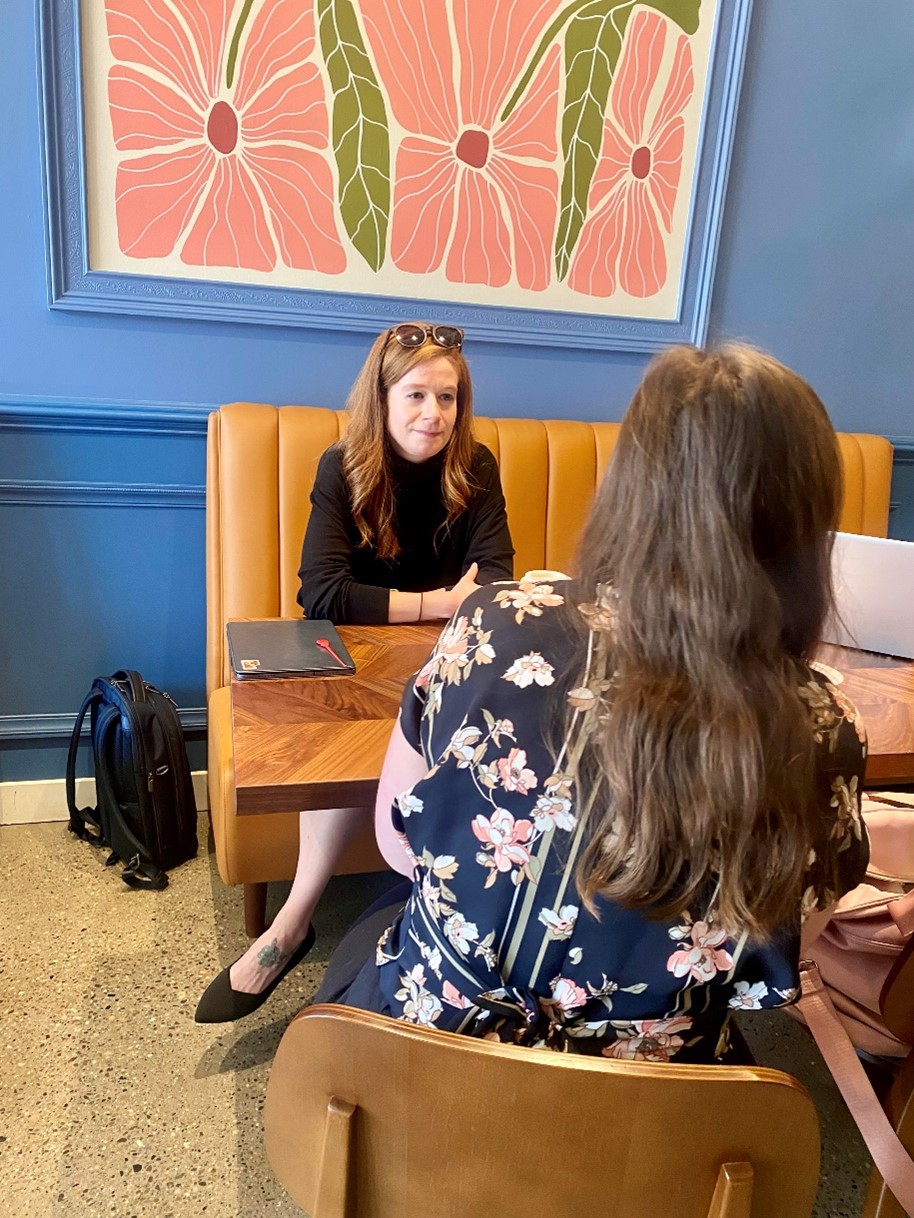
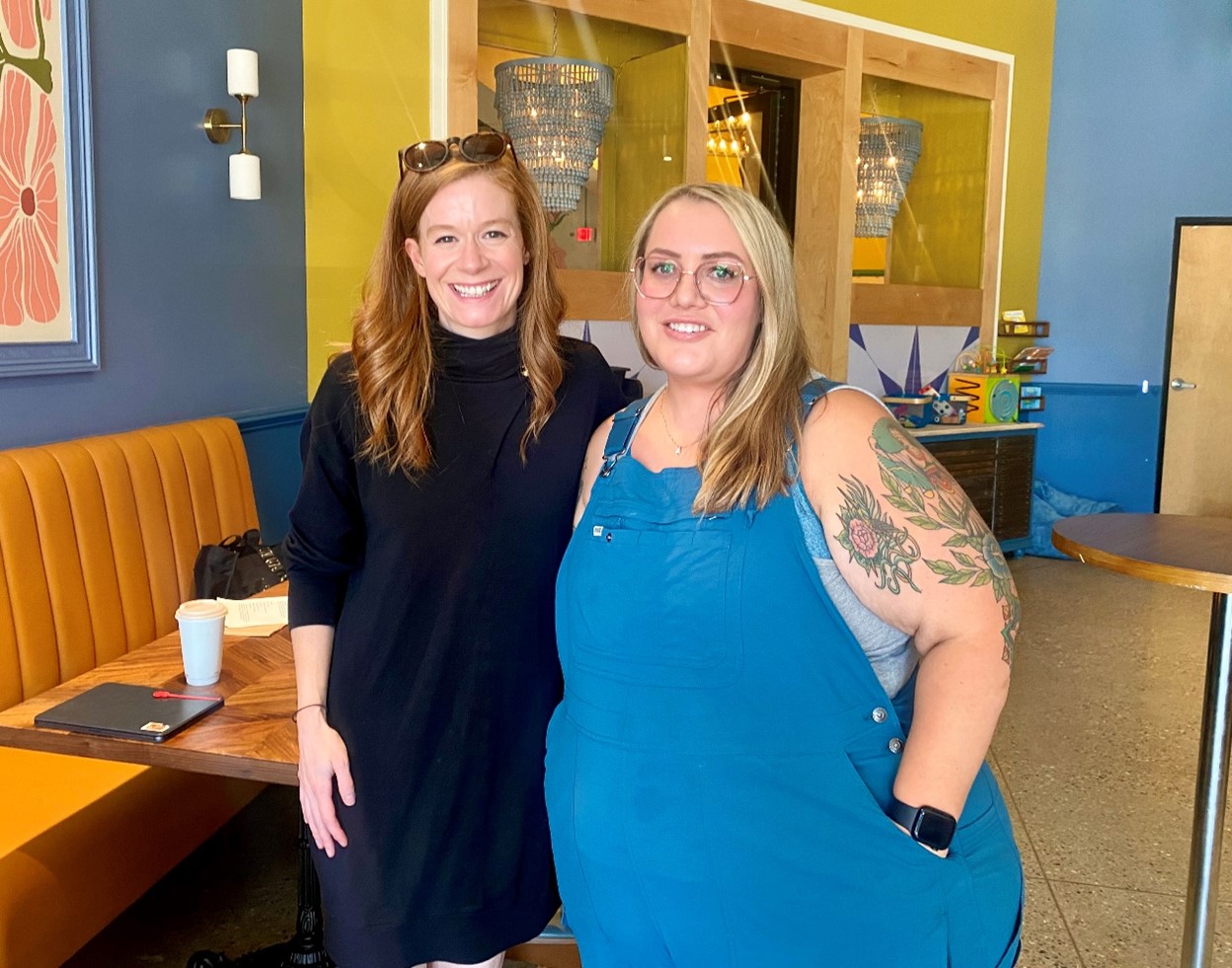
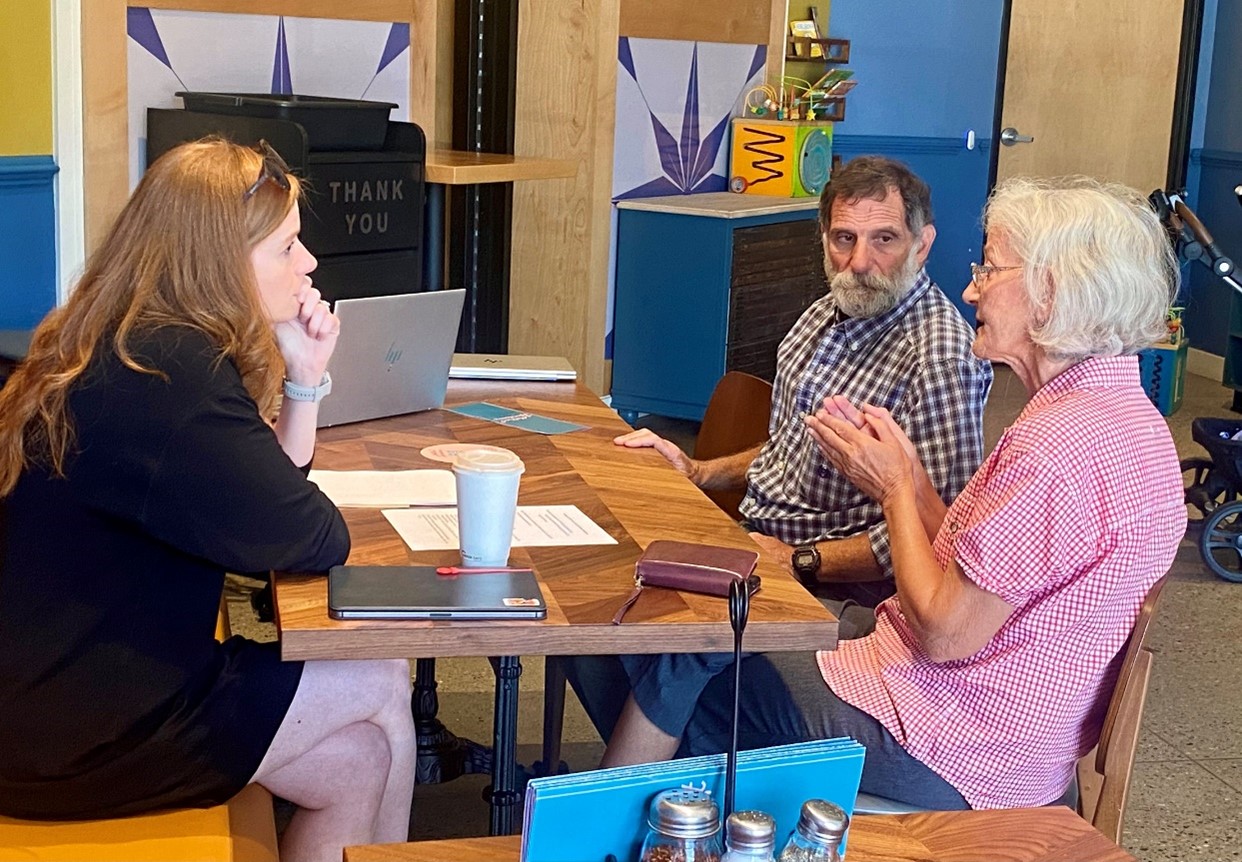
We rotate around the district for our “office hours,” and we were in Oak Park this month. The discussions were about the safe storage gun law and how it might be strengthened, the need for more foster care reunification housing, and a request for more training for police, jail, and prison staff to better understand mental health, addiction, and suicide prevention.
The idea to launch this format came from reading that Governor Romney held office hours at the Capitol every Thursday morning, during which any resident of the state could come and meet him for five minutes. I loved the idea of carving out constituent time that is protected and prioritized from the many directions this job tends to pull us in any given week.
Once Senate session resumes, we will also be promoting our Sunday Livestreams (on Twitter, Facebook, LinkedIn, Instagram and YouTube) so you can tune in and ask anything!
Twelfth Night Opening Kickoff

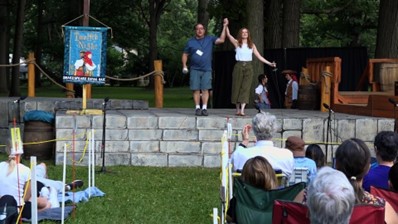
I helped to open Royal Oak Shakespeare’s “Twelfth Night” with a friendly sword fight with founder Ed Nahhat!
Good News From the District
Summer Flowers

The Flower Project Photo: David Rodriguez Munoz, Detroit Free Press

Griffin Gardens Photo: David Rodriguez Munoz, Detroit Free Press
Congratulations to Griffin Gardens in Detroit and The Flower Project in Ferndale for being profiled in the Detroit Free Press as two of the top eight Michigan farms to buy local flower bouquets! They have beautiful locally grown flowers. Read more in the article here.
New Baby Gorilla at the Detroit Zoo

Bandia is now the proud mother of the first gorilla born at the Detroit Zoo in their 96-year history! The baby is healthy and thriving under mom’s attention. The zoo’s animal care team is ensuring that both are receiving the best care during this time and that critical developmental milestones are being observed. To give Bandia and baby a calm and quiet place to bond, the Great Apes building, and the gorilla’s outdoor habitat are temporarily closed to guests. The outdoor chimpanzee habitat is open.
Michiganders in Paris!

Are you missing that Olympic excitement after the closing ceremonies? Well, it’s not over just yet! We have amazing local athletes participating in the Paralympic Games starting August 28th!
20-year-old Jaydin Blackwell of Oak Park is in Paris as part of the men’s ambulatory sprints team! Jaydin was born prematurely at only 26 weeks and was diagnosed with Cerebral Palsy, a disease affecting the ability to maintain balance and posture. The type that he has also causes leg muscles to become rock hard. He started track and field after family friends invited his brother and him to join the AAU’s Motor City Track Club in Detroit. He is still with the same coach he has had since middle school.
The 2024 ESPY Award nominee had a world record qualifying time in the 100-meter event at the Para Athletics World Championships this year which qualified him for the Paris games in that event. He will compete in the men’s 100 and 400-meter sprints for Team USA’s T38 classification, which is for track and field athletes with certain types of Cerebral Palsy.

Photo Getty Images
And Team McMorrow has a connection to another Paralympian! Our office manager is a former teacher and coached Scout Bassett on Model UN and the Forensics Team in high school. Bassett spent seven years in a government-run orphanage in China after she was abandoned following the loss of her right leg in a chemical fire as an infant. She was adopted by Joe and Susan Bassett and moved to Michigan at the age of seven. Still learning English, Bassett joined sports to connect with her peers. At 14, she was introduced to the Challenged Athletes Foundation (CAF), who gave her a grant to fund her training while also allowing her to attend running clinics and mentor young amputees. She qualified for her first U.S. Paralympic Team in 2016.
Follow the action via the Paralympic YouTube Channel or the International Paralympic Committee website.
Go Team USA!
